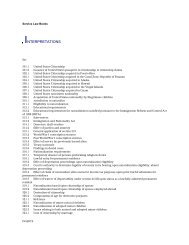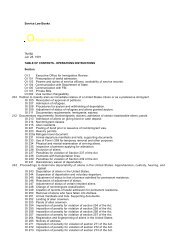You also want an ePaper? Increase the reach of your titles
YUMPU automatically turns print PDFs into web optimized ePapers that Google loves.
<strong>Inspector's</strong> <strong>Field</strong> <strong>Manual</strong><br />
G-445), and other materials that will later be useful in determining the trainee's readiness for promotion. The<br />
training itself should include a combination of academic instruction and on-the-job training (OJT) assignments.<br />
Providing such instruction usually involves the cooperation of training officer and journeyman inspectors. Each<br />
step in the academic training and the OJT should be recorded. Special attention in the preacademy training<br />
should be given to those areas that are not covered thoroughly in the Academy and areas involving local policy<br />
covering situations commonly encountered at the trainee's duty station.<br />
(3) Academy Training.<br />
New permanent full time inspectors generally enter the Service at the GS-5 level and go through a two year<br />
training period to reach the journeymen level of GS-9. Some inspectors enter through special programs at the<br />
GS-7 level. In both cases, the Inspector goes through a one year period of probation. During this time he or she is<br />
required to attend The Immigration Officers Basic Training Course (IOBTC) at the Immigration Officer<br />
Academy (IOA) in Glynco, Georgia and to complete a twenty-week Post Academy Course. A trainee will be<br />
detailed to the IOA within thirty days of entry on duty when administratively and operationally feasible.<br />
The course at IOA consists of ten weeks of Immigration and law enforcement courses. Each attendee is also<br />
tested in Spanish. Those that are found to be adequate in the Spanish language return to their duty station on<br />
graduation from the basic course. Those who need more instruction are kept for a four week total immersion<br />
course in Spanish.<br />
Other than permanent full time (OTP) inspectors are also hired at the GS-5 level with promotion potential to<br />
GS-7. They are required to attend and satisfactorily complete a special OTP basic training program. Phase I of<br />
this course is a four week course given at IOA. Phase II is completed at the <strong>Inspector's</strong> duty station. Phase II must<br />
be completed within 90 days of the completion of phase I. If the individual cannot pass the course, he or she will<br />
be given another opportunity to take and pass the course. If an individual cannot pass the course on the second<br />
attempt, district management will review the individual's case and consult with Regional Personnel.<br />
Successful completion of the IOBTC is a requirement for any OTP immigration inspector who is converted to a<br />
full-time, permanent Officer Corps position.<br />
(4) Post Academy Training.<br />
IOBTC and OTP basic are both followed by formal post academy training courses. Both courses are obtained<br />
from and administered by the Immigration Officer Academy. These courses cover most of the material needed<br />
by the immigration inspector. However, inspectors work in a complex, constantly changing work environment.<br />
There is a need for continuing informal post academy training that provides for the updating of knowledge and<br />
skills. Some of the needed information will come from supervisory briefings, some from formal classes given by<br />
training officers, special operations officers, intelligence officers, or senior inspectors, and some training<br />
material is provided by the Service in the form of video tapes.<br />
One form of self-help instruction comes in the form of locally prepared "how to" manuals. They have copies of<br />
completed forms, sample A files, form letters or memoranda, instructions on the use of computer systems,<br />
sample copies of exclusion or prosecution cases, etc. These books provide easy references for work in progress<br />
and study materials for both trainees and journeymen.<br />
(5) Computer Training.<br />
Computers have played a part in the inspection process for quite some time. Each year more of our processes<br />
become automated. The inspector needs certain computer skills to do his or her job. On primary there is need to<br />
query vehicles and individuals. In secondary he or she must be able to run on-line queries on CIS, NIIS, STSC,<br />
NAILS, IBIS, NLETS/NCIC, and OASIS. Inspectors must be able to change their passwords in PICS and IBIS.<br />
Reports and memoranda are prepared on off-line systems such as Word Perfect, or on Service-developed<br />
systems such as the Performance Analysis System (PAS). Many offices have established a local area networks<br />
(LAN) that contain the software for word processing, spreadsheets, and databases. The Academy has provided<br />
for some orientation in the on-line systems but "hands-on" training in these systems as well as most off-line<br />
training is done locally.




